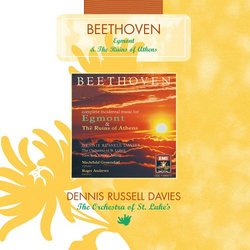| All Artists: Beethoven, Davies Title: Egmont: Incidental Music Members Wishing: 0 Total Copies: 0 Label: Angel Records Original Release Date: 1/1/1995 Re-Release Date: 10/4/2005 Genre: Classical Styles: Historical Periods, Classical (c.1770-1830), Symphonies Number of Discs: 1 SwapaCD Credits: 1 UPC: 094633155527 |
Search - Beethoven, Davies :: Egmont: Incidental Music
 | Beethoven, Davies Egmont: Incidental Music Genre: Classical
|
Larger Image |
CD DetailsSimilarly Requested CDs |
CD ReviewsSOUND ENOUGH DAVID BRYSON | Glossop Derbyshire England | 03/04/2009 (4 out of 5 stars) "In the song immediately following the Egmont overture Claerchen declaims `How my heart pounds, my blood rushes!' For my own part, I find this a very safe and recommendable complete issue of these two sets of incidental music. However mir klopft nicht das Herz, mir wallt nicht das Blut.
Is this to be put down to the performance, or to the listener, or just possibly to the music itself, at least in part? Beecham said that Beethoven wrote highly dramatic music for the concert hall but music for the stage that was not very dramatic, and Shaw declared even more bluntly `Beethoven was no dramatist.' The composer was hugely excited by the commission to do incidental music for Goethe, and his Egmont music sounds to me like very good quality middle-period Beethoven. The overture in particular made a huge early impression on me as a boy, mainly on account of the descending phrase at the start of the fast section, with its thrilling suggestion of a beam of sunlight reaching down into the bowels of some tenebrous dungeon. That impression remains with me in some performances, but only marginally in this one, and the marginal feel stays throughout the following numbers. The two songs are well done, but not so as to overexcite me, and the entr'actes and whatnot win my approval without arousing my excitement either. These pieces all sound well worthy of the great overture in one sense, but in another sense I have a job convincing myself that Beethoven's incidental music for Goethe is really superior to Grieg's for Ibsen and that Claerchen's death as depicted by the greater master is more expressive or moving than Aase's as put to music by the lesser. In fact I would go so far as to say that neither is nearly as good as the music Sibelius wrote for Maeterlinck's Pelleas et Melisande. If so, there is only a certain amount that any interpreters can do about it. Such an opinion is mainly subjective, quite obviously. I can't really `fault' anything here: it's just that when I think back to some of the great turgid conducting giants of two generations ago I can only feel that an additional sense of electricity would have been generated by Toscanini in Egmont, and an extra dimension of grace would have adorned the Ruins of Athens music if it had been Beecham in charge. What I find here instead is a pair of accounts that I suspect would have won the approval of Karajan. Like the Egmont suite, the Ruins of Athens music is very well done in a similarly unremarkable way, including the vocal contributions from both the two soloists and the chorus. The theme here is manifestly less lofty, indeed the play sounds to me to be absolute twaddle if the summaries that I know are anything to go by. The high opus-number probably misrepresents the time and context of its composition, and I imagine that nobody will come to the Ruins expecting anything like the mighty overture on the Consecration of the House, op 124. My own selection of this disc as opposed to certain others was based principally on its completeness - it suits my collection to have these two sets of incidental music all together on one playing-surface, providing an hour and a quarter of comparatively out-of-the-way music by Beethoven. The recording is from 20 years ago and is again very good without setting the pulse racing, the conductor's name does not seem familiar to me, and I am actually not quite certain who the orchestra are. The London Symphony Orchestra is mentioned, and so is a group called the Orchestra of St Luke's. Is the latter an alias of the former, or is it possible that both are playing here (surely not simultaneously)? The full texts are given in German with English translation, and the liner commentary is quite instructive. My eyesight is easily up to reading both elements in their small red print (very small indeed where the texts are concerned) against a bright yellow ochre background, and I hope that yours is similarly. I suppose that this notice does not amount to a paean of praise, but I have no regrets about what I have acquired here, and there is no reason why you should be disappointed either so long as you start with realistic expectations. I can't help feeling that the music itself is not the kind of Beethoven that would start revolutions or move mountains. Why should it be? There is plenty of that elsewhere in his output." |

 Track Listings (19) - Disc #1
Track Listings (19) - Disc #1



